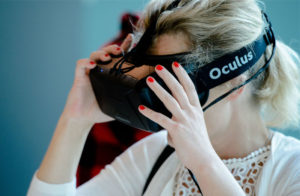Virtual reality technology could be a powerful tool in diagnosing social anxiety disorder
 This is one of the first studies that used VR as a possible diagnostic tool (in this case for social fear),” explained study author Youssef Shiban of the University of Regensburg.
This is one of the first studies that used VR as a possible diagnostic tool (in this case for social fear),” explained study author Youssef Shiban of the University of Regensburg.
“Once validated in other studies, this could open new doors for us as therapists and researchers, as we can use behavioral and psychophysiological data to better diagnose.
The study of 19 low- and 18 high-socially-anxious participants used two different virtual social environments. One environment involved the participant obtaining a train ticket. The second virtually recreated the waiting room of a doctor’s office.
The researchers monitored the participants’ eye movements and skin conductance while they navigated the virtual worlds — but only observed a higher skin conductance response in high-anxious participants in the train scenario. However, they observed that in both virtual environments the high-anxious group concentrated their gaze for a significantly shorter time on the faces of the avatars.
Previous research has found that anxious individuals are quick to gaze at potentially threatening stimuli but subsequently avert their eyes, which serves as a defensive reaction to reduce anxiety.
The study, “Potential Of Virtual Reality As A Diagnostic Tool For Social Anxiety: A Pilot Study“, was also co-authored by Martin Dechant, Sabine Trimpl, Christian Wolff, Andreas Mühlberger.
See the full story here: http://www.psypost.org/2017/09/virtual-reality-technology-powerful-tool-diagnosing-social-anxiety-disorder-49717
Pages
- About Philip Lelyveld
- Mark and Addie Lelyveld Biographies
- Presentations and articles
- Tufts Alumni Bio